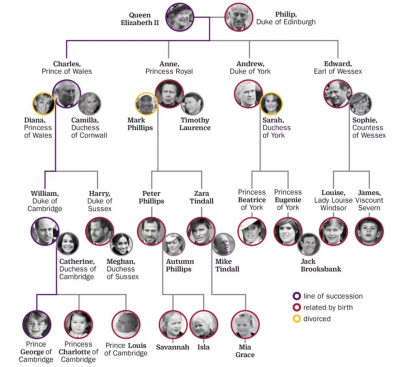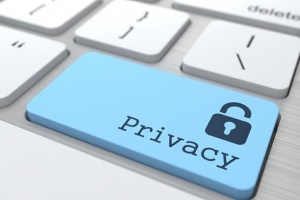Difference between revisions of "Ancestry data"
(→Consequences of using technology) |
|||
| Line 32: | Line 32: | ||
[[File:Privacy.jpeg|300px|thumb|right]] | [[File:Privacy.jpeg|300px|thumb|right]] | ||
Norman Mooradian’s states in his paper “Importance of privacy revisited”, that people should be able to control or restrict the access of information <ref>Mooradian, Norman. “The Importance of Privacy Revisited.” Ethics and Information Technology, vol. 11, no. 3, 14 July 2009, pp. 163–174., doi:10.1007/s10676-009-9201-2.</ref>. To combat the potential consequences found with how ancestry data is used today, it is important to give people the option. AncestryDNA does offer an opt-in/opt-out feature for sharing information for research purposes when users first sign up. They also do offer the same feature later on, but it is difficult to find. This feature is a great example of being able to control exactly how the data is shared and controlled. | Norman Mooradian’s states in his paper “Importance of privacy revisited”, that people should be able to control or restrict the access of information <ref>Mooradian, Norman. “The Importance of Privacy Revisited.” Ethics and Information Technology, vol. 11, no. 3, 14 July 2009, pp. 163–174., doi:10.1007/s10676-009-9201-2.</ref>. To combat the potential consequences found with how ancestry data is used today, it is important to give people the option. AncestryDNA does offer an opt-in/opt-out feature for sharing information for research purposes when users first sign up. They also do offer the same feature later on, but it is difficult to find. This feature is a great example of being able to control exactly how the data is shared and controlled. | ||
| + | |||
| + | In addition to the danger of peoples' DNA data being released to big pharmaceutical companies, there are issues regarding the release of DNA to law enforcement. Currently, websites like Ancestry and 23andMe have been dipped into by law enforcement in order to solve cases. Most users of these companies to find out simple things, like if they have European heritage, have no idea that by submitting their DNA they are subjecting it to use by law enforcement. In Carolyn Crist's article, she urges users to understand that by uploading their DNA, it can be subject use by law enforcement <ref> Carolyn Crist, “Experts outline ethics issues with use of genealogy DNA to solve crimes” Reuters, 1 June. 2018, https://www.reuters.com/article/us-health-ethics-genealogy-dna/experts-outline-ethics-issues-with-use-of-genealogy-dna-to-solve-crimes-idUSKCN1IX5O6.</ref> | ||
=== References === | === References === | ||
[[Category:2019New]] | [[Category:2019New]] | ||
Revision as of 19:26, 26 March 2019
Ancestry data is the data that has been collected for centuries on people’s ancestry, namely a person's ethnic origin or heritage, where they were born, or who they are related to. Records of this data have been kept for thousands of years. Keeping this data was important to clearly define concepts of birthright and successions in both modern and ancient civilizations.
For example, the longest surviving family tree to be recorded, in great detail, is that of the Imperial House of Japan. Since 660 BC, the decedents of Emperor Jimmu have been documented all the way to present day, detailing the appropriate line of succession.
In modern day, technology has changed the way in which people care about ancestry data. Companies like 23andMe and AncestryDNA have made it cost effective and efficient to get a full ethnic background map and potential family tree links we didn’t know existed. This new form of Ancestry data grew out of people’s fascination with wanting to know who were, where we are from, and what we are made of. It has ushered in a new form of personalized medicines and treatment plans based on our genetic makeup. As of 2014, genealogy or the study of genetics was a 2-billion-dollar industry and growing [1]. Now, it is affordable and efficient for people to discover more about themselves and their ancestry.
Contents
Modern day use and influence of technology
Since the discover of the double helix by Francis Crick and James Watson in 1935, we have tirelessly looked to better understand human DNA and the human genome. We have come so far that for under $100 you can have your DNA processed and analyzed to help tell you exactly who you are.
How it works today
For a person to get their ancestry data, there are only a few steps. Simply order a kit from a company like 23andMe, follow the DNA harvesting directions (i.e. spit in to a small plastic tube), and then send it back to the company. However, there is much more that is handled on the ancestry company’s end.
Once a DNA sample is received by an ancestry company like AncestryDNA or 23andMe, they begin to process and sequence the DNA. DNA is made up of 4 nucleobases represented as C, G, A, and T. Once sequenced, there is will be just a long string of those letters that means basically nothing to the naked eye. Robin Smith, head of 23andMe’s Ancestry program said it works like this, “the way that the algorithm works, it takes an entire genome and chunks it up," Smith said. "It takes little pieces, and for each piece, it compares it against the reference data set. It compares it against British; it compares it against West African; it goes through the entire list, and it spits out a probability for [where that piece of DNA came from]" [2]. It is also able to recommend potential relatives based on near complete matches of DNA with very accurate results for those considered “Close Family” or “First Cousins”.
Technology and advancement have made it extremely easy for us to grasp the full power of our genes and truly figure out who we are. Like all things improving through the use of technology, there are great benefits and consequences.
Benefits of using technology
Aside from learning more about your ancestry, 23andMe takes using genealogy to the next step. They offer more than 100 different tests that tell you more about your health. You can discover what dominant traits you have to pass down to your offspring, what genes effect your well-being and which don’t, and what foods you should and shouldn’t eat [3].
23andMe has used their ancestry and DNA data banks to aid in research as well. For example, a study done by Dr. Abraham Palmer and his team at University of California, San Diego School of Medicine used over 20,000 consenting 23andMe users to determine that there is connection between impulsiveness and drug use in people [4]. Other studies have identified many genes related to depression and other mental illness as well.
One of the more popular claims to fame is the capture of the Golden State Killer. Law enforcement used DNA profiles from ancestry sites to catch and identify the killer by first locating his relatives [5]. This is becoming an increasingly common method for law enforcement, which is definitely a great thing to find people who are a harm to society.
Ancestry data has developed into a much broader meaning with the influence of technology. However, like most things that advance and improve from technology, there are negative consequences.
Consequences of using technology
Much like Facebook and other social media sell and share our data with their partners, 23andMe does the same thing, but with big pharmaceutical companies, like their $300 million-dollar deal with GlaxoSmithKline [6]. Deals such as this grant our extremely personal data to organizations to do research among other things.
Once the DNA data and ancestry data has been processed, it is almost impossible for the data to be removed from the site, if a user ever wishes. Leaks are also very common and it an extremely unsettling feeling for users [7]. All the data is anonymized however, but that is data on our genetic makeup, which is just as personal as say a social security number.
Norman Mooradian’s states in his paper “Importance of privacy revisited”, that people should be able to control or restrict the access of information [8]. To combat the potential consequences found with how ancestry data is used today, it is important to give people the option. AncestryDNA does offer an opt-in/opt-out feature for sharing information for research purposes when users first sign up. They also do offer the same feature later on, but it is difficult to find. This feature is a great example of being able to control exactly how the data is shared and controlled.
In addition to the danger of peoples' DNA data being released to big pharmaceutical companies, there are issues regarding the release of DNA to law enforcement. Currently, websites like Ancestry and 23andMe have been dipped into by law enforcement in order to solve cases. Most users of these companies to find out simple things, like if they have European heritage, have no idea that by submitting their DNA they are subjecting it to use by law enforcement. In Carolyn Crist's article, she urges users to understand that by uploading their DNA, it can be subject use by law enforcement [9]
References
- ↑ amietennant. “The Genealogy Industry: $2 Billion–and Growing!” Genealogy Gems, 11 Dec. 2014, lisalouisecooke.com/2014/12/11/genealogy-industry-growing/.
- ↑ Letzter, Rafi. “How Do DNA Ancestry Tests Really Work?” LiveScience, Purch, 4 June 2018, www.livescience.com/62690-how-dna-ancestry-23andme-tests-work.html.
- ↑ 23andMe. “Our Health + Ancestry DNA Service.” 23andMe, www.23andme.com/dna-health-ancestry/.
- ↑ 23andMe. “Genetic Study of Impulsiveness Reveals Associations with Drug Use.” 23andMe Blog, 4 Feb. 2019, blog.23andme.com/23andme-research/genetic-study-of-impulsiveness-reveals-associations-with-drug-use/.
- ↑ Romano, Aja. “DNA Profiles from Ancestry Websites Helped Identify the Golden State Killer Suspect.” Vox, Vox, 27 Apr. 2018, www.vox.com/2018/4/27/17290288/golden-state-killer-joseph-james-deangelo-dna-profile-match.
- ↑ Martin, Nicole. “How DNA Companies Like Ancestry And 23andMe Are Using Your Genetic Data.” Forbes, Forbes Magazine, 5 Dec. 2018, www.forbes.com/sites/nicolemartin1/2018/12/05/how-dna-companies-like-ancestry-and-23andme-are-using-your-genetic-data/#5d3ba70a6189.
- ↑ Brodwin, Erin. “DNA-Testing Company 23andMe Has Signed a $300 Million Deal with a Drug Giant. Here's How to Delete Your Data If That Freaks You out.” Business Insider, Business Insider, 25 July 2018, www.businessinsider.com/dna-testing-delete-your-data-23andme-ancestry-2018-7.
- ↑ Mooradian, Norman. “The Importance of Privacy Revisited.” Ethics and Information Technology, vol. 11, no. 3, 14 July 2009, pp. 163–174., doi:10.1007/s10676-009-9201-2.
- ↑ Carolyn Crist, “Experts outline ethics issues with use of genealogy DNA to solve crimes” Reuters, 1 June. 2018, https://www.reuters.com/article/us-health-ethics-genealogy-dna/experts-outline-ethics-issues-with-use-of-genealogy-dna-to-solve-crimes-idUSKCN1IX5O6.


